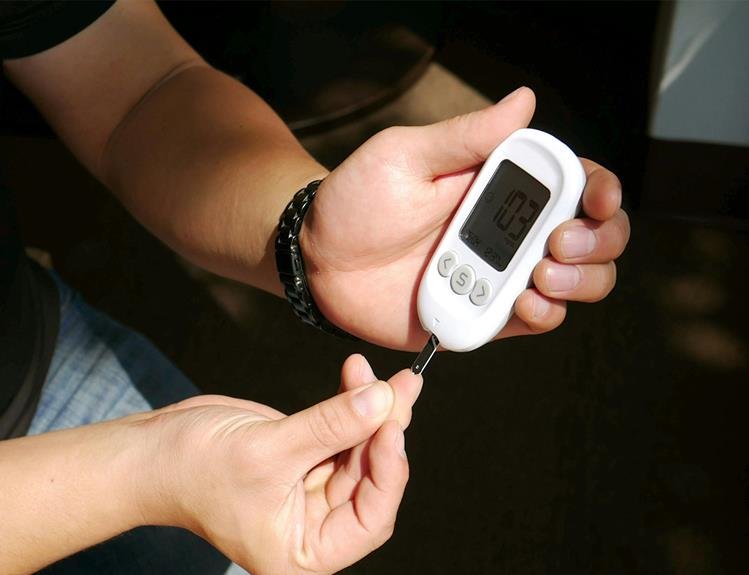Skinny Doesn't Mean Healthy: Navigating Diabetes in Thin Bodies
Just like a hidden iceberg, the impact of diabetes on thin bodies can often be underestimated. Despite appearances, the correlation between weight and health is not always straightforward.
Understanding how diabetes manifests in lean individuals is crucial for early detection and effective management. By unearthing the nuances of this relationship, you will gain valuable insights into the complexities of diabetes beyond the scale.
Stay tuned to uncover strategies and considerations that can help you navigate this intricate landscape with confidence and knowledge.
Risk Factors for Thin Individuals
If you're thin and living with diabetes, understanding the unique risk factors for individuals with a lower body mass index is crucial for managing your health effectively. While being thin is often associated with being healthy, it doesn't guarantee immunity from diabetes-related complications. Thin individuals with diabetes face specific challenges that require careful attention.
One significant risk factor for thin individuals with diabetes is the possibility of delayed diagnosis. Due to the misconception that only overweight individuals develop diabetes, doctors may not immediately consider diabetes as a potential diagnosis for thin patients exhibiting symptoms. This delay can result in missed opportunities for early intervention and proper management of the condition.
Additionally, thin individuals with diabetes may have less muscle mass and lower physical activity levels, which can impact their overall blood sugar control. Since muscle plays a vital role in glucose metabolism, maintaining a healthy level of physical activity is crucial for managing diabetes effectively in thin bodies.
Understanding and addressing these unique risk factors can help thin individuals with diabetes navigate their health journey more successfully. By staying informed and proactive, you can take control of your health and work towards optimal diabetes management.
Importance of Regular Monitoring
You need to prioritize monitoring your blood sugar levels regularly, tracking your food intake, and checking your insulin dosage to effectively manage diabetes in your thin body.
By staying on top of these key aspects, you can maintain stable blood sugar levels and avoid complications associated with diabetes.
Consistent monitoring is crucial for your overall health and well-being.
Monitor Blood Sugar Levels
Regularly monitoring your blood sugar levels is crucial for managing diabetes effectively. By keeping track of your levels throughout the day, you can better understand how different foods, activities, and medications impact your blood sugar.
Consistent monitoring helps you identify patterns and make informed decisions to keep your levels within a healthy range. It allows you to detect and address any spikes or drops promptly, reducing the risk of complications. Additionally, regular monitoring provides valuable information for you and your healthcare team to adjust your treatment plan as needed.
Track Food Intake
Monitoring your food intake is essential for effectively managing diabetes in thin bodies. Keeping track of what you eat can help you understand how different foods affect your blood sugar levels. By monitoring your food intake, you can identify patterns, make necessary adjustments to your diet, and maintain stable glucose levels.
It's crucial to pay attention to portion sizes, carbohydrate intake, and the timing of your meals. Consider using a food diary or a mobile app to record your meals and snacks. This practice can also help you work closely with your healthcare provider to create a personalized meal plan that suits your specific needs.
Check Insulin Dosage
To effectively manage diabetes in thin bodies, it's crucial to ensure the proper checking of your insulin dosage to maintain stable glucose levels. Regular monitoring of your insulin intake is essential to prevent sudden spikes or drops in blood sugar levels.
Remember to follow your healthcare provider's instructions carefully and adjust your dosage as needed based on your activity level, diet, and overall health. Keeping a log of your insulin doses, along with corresponding blood sugar readings, can help you identify patterns and make informed decisions about your diabetes management.
Nutritional Considerations for Thin Bodies
When managing diabetes in a thin body, focusing on nutrient-dense food choices and balancing calorie intake is crucial.
It's essential to prioritize foods that provide essential vitamins and minerals while maintaining a healthy weight.
Nutrient-Dense Food Choices
Choosing nutrient-dense foods is essential for maintaining a healthy diet, especially when considering the nutritional needs of thin bodies. Opt for whole grains, lean proteins, fruits, vegetables, and healthy fats to ensure you're getting essential vitamins, minerals, and energy.
Incorporate foods like quinoa, salmon, leafy greens, nuts, and seeds into your meals to support overall health. These nutrient-rich options can help regulate blood sugar levels, improve insulin sensitivity, and promote a balanced weight.
Be mindful of portion sizes and aim for a colorful plate to ensure a variety of nutrients. By making these nutrient-dense choices, you can support your body's needs and reduce the risk of diabetes complications, even in a thin body.
Balancing Calorie Intake
Transitioning from nutrient-dense food choices, ensure you maintain a balanced calorie intake to support the nutritional needs of thin bodies.
Opt for whole grains, lean proteins, healthy fats, and a variety of fruits and vegetables to provide essential nutrients without excess calories.
Monitor portion sizes to avoid overeating while still meeting your calorie requirements. Snack on nuts or seeds, yogurt, or whole fruit to add calories healthfully throughout the day.
Consider incorporating healthy snacks between meals to keep your energy levels stable. Remember that even in thin bodies, it's crucial to find the right balance of calories to maintain a healthy weight and support overall well-being.
Consult with a healthcare provider or a dietitian for personalized recommendations.
Physical Activity Recommendations
Staying active is essential for managing diabetes in thin bodies. Regular physical activity helps control blood sugar levels, improves insulin sensitivity, and lowers the risk of heart disease – all crucial aspects of diabetes management. Aim for at least 150 minutes of moderate-intensity aerobic exercise per week, like brisk walking or cycling. Additionally, incorporate strength training exercises at least two days a week to build muscle mass, which can further enhance glucose metabolism.
Find activities you enjoy to make staying active a sustainable part of your routine. Whether it's dancing, swimming, or playing sports, choose something that keeps you engaged and motivated. Remember, even small bursts of activity throughout the day can make a difference. Take the stairs instead of the elevator, go for a short walk during your lunch break, or do bodyweight exercises while watching TV.
Consult with your healthcare provider before starting any new exercise regimen, especially if you have diabetes. They can provide personalized recommendations based on your health status and fitness level. By prioritizing physical activity, you can effectively manage diabetes and improve your overall well-being.
Emotional Well-being and Support
To effectively manage diabetes in thin bodies, it's crucial to prioritize your emotional well-being and seek support. Managing a chronic condition like diabetes can take a toll on your mental health, so it's important to address your emotional well-being. Living with diabetes can bring about feelings of anxiety, stress, and even depression. It's essential to recognize these emotions and seek help when needed.
Surround yourself with a supportive network of friends, family, or a diabetes support group to share your experiences and feelings. Talking to others who understand what you're going through can provide comfort and reassurance.
Additionally, consider seeking professional help from a therapist or counselor who can assist you in developing healthy coping mechanisms and strategies to manage the emotional challenges that may arise. Remember, taking care of your emotional well-being is just as important as managing your physical health when it comes to navigating diabetes in a thin body.
Working With Healthcare Providers
Collaborate closely with your healthcare providers to effectively manage diabetes in thin bodies and optimize your overall health. Regular check-ups, blood tests, and consultations are key in monitoring your blood sugar levels and overall well-being. Keep an open line of communication with your healthcare team, sharing any concerns, questions, or changes in your symptoms. Be proactive in discussing your unique needs as someone with diabetes in a thin body, as treatment approaches may differ from those for individuals with higher body weights.
Ensure your healthcare providers are knowledgeable about the specific challenges thin individuals may face when managing diabetes. Advocate for yourself by seeking out healthcare professionals who are experienced in treating diabetes in individuals with varying body types. Work together to create a tailored treatment plan that considers your body's specific requirements and aims to maintain stable blood sugar levels while supporting your overall health and well-being. Remember, effective management of diabetes in a thin body requires a collaborative effort between you and your healthcare team.
Frequently Asked Questions
Can Thin Individuals Still Be at Risk for Developing Diabetes?
Yes, thin individuals can still be at risk for developing diabetes. It's important to focus on lifestyle factors like diet and exercise to manage your risk. Regular check-ups and blood sugar monitoring are crucial for early detection.
Are There Any Specific Dietary Guidelines for Managing Diabetes in Thin Bodies?
When managing diabetes in thin bodies, focus on balanced meals, controlling portion sizes, and monitoring blood sugar levels regularly. Incorporate fiber-rich foods, lean proteins, and healthy fats into your diet to support stable blood sugar levels.
What Types of Physical Activities Are Recommended for Thin Individuals With Diabetes?
To manage diabetes effectively, try incorporating a mix of aerobic activities like walking or cycling and strength training exercises like lifting weights. Consult with a healthcare provider to personalize a suitable workout routine for you.
How Can Thin Individuals With Diabetes Cope With Emotional Challenges and Find Support?
When managing diabetes as a thin person, cope with emotions by seeking support from loved ones, therapists, or support groups. Engage in activities you enjoy. Practice mindfulness and self-care. Remember, it's okay to ask for help.
What Should Thin Individuals Keep in Mind When Working With Healthcare Providers to Manage Their Diabetes?
When working with healthcare providers to manage diabetes, remember you're the boss of your body. Ask questions, seek options, and never settle for less than personalized care. Don't forget, you hold the reins to your health journey.
Conclusion
So remember, just because you're skinny doesn't mean you're immune to diabetes.
Stay on top of your health by monitoring your blood sugar levels regularly, eating a balanced diet, staying active, and seeking emotional support when needed.
It's like tending to a delicate flower garden – with care and attention, you can thrive and prevent diabetes from taking root in your life.
Take charge of your health and live your best life!






